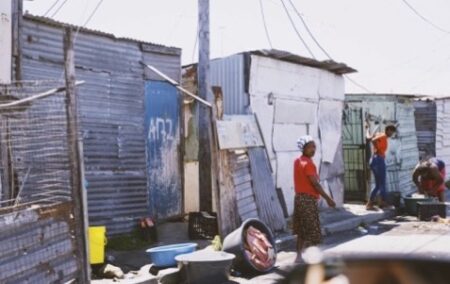What does 2022 hold for South Africa? We continue to consider the country to be in an exceptionally fragile state both politically and economically.
South Africa remains vulnerable to exogenous shocks, and we expect the volatility experienced in 2021 to continue this year.
No reform
As long as the African National Congress (ANC) remains in control, we are confident in saying that fundamental policy reform will not materialise. Consequently, South Africa will not see much by way of a short-term economic recovery and will prove unable to increase its resilience to external risks in the global economy, of which there are many.
Since 2012, we have been alerting our clients to the likelihood of a political realignment by the end of the decade. That prospect could now be closer than we thought. Last November’s local government election results showed the ANC dropping below the critical 50% support mark for the first time, as voters made the party pay for the sins of unemployment, poverty, low growth, poor service delivery and load shedding.
As the government is unlikely to achieve significant turnarounds on any of these measures by 2024, the ANC’s prospects of shoring up its support — and getting back above 50% — are slim.
More of the same until 2024
Our call for the intervening years in the run-up to 2024 is that there will be no fundamental shift in economic policy. Economic growth will continue to disappoint, with the Treasury’s forecasts of 1.6%-1.8% in the ballpark and perhaps erring on the upside.
The Q3 2021 GDP figures showed the economy contracting by 1.5% — reflecting the July unrest — amidst electricity constraints and an unfavourable investment environment, all factors that are likely to persist in the medium term.
None of the requirements for a turnaround will be met, such as a firm commitment to uphold property rights, the scrapping of race-based policies in favour of needs-based empowerment policies, fundamental education reform, the privatisation of state-owned enterprises or the depoliticisation of public administration.
As a result, there will be no substantial improvements in the dramatic levels of poverty and unemployment. Social unrest will continue to worsen and blow-outs like the July unrest in KwaZulu-Natal are likely to recur.
On corruption, the authorities will continue to generate a great deal of noise, but very little heat. Accountability will be more honoured in the breach than in the observance, further eroding respect for the law. The state will continue to recede from the lives of ordinary South Africans as the foundations of its competence, respect and resources are further eroded.
We expect that Covid-19, a key driver of global developments over the past two years, will continue to return in waves, as it has done to date. However, if the Omicron variant is anything to go by, future waves are likely to be less lethal. If this assumption proves to be correct, such waves will generate high numbers of cases, but far fewer deaths, thanks to vaccines, convalescent immunity, and virus mutations. This will signal an eventual decline in lockdowns, travel bans and other disruptive public health measures in the medium term.
Disruption brings opportunity
In South Africa, the biggest opportunity continues to be to fill the gaps left by the receding state. In fields such as education, healthcare, security, electricity and water, the state will continue to underperform, creating openings for private companies to supply these services.
A further opportunity lies in helping citizens organise and mobilise to build functioning local communities and assert themselves in their relationship with the state.
Go against the grain
While the CRA provides strategic advice — not investment advice — you may want to discuss the following with your financial advisor.
Globally, the easy opportunity is to keep investing in the bull market and riding the asset price bubble. The hard opportunity — but potentially much more lucrative, if you get it right — is to time the crash and set yourself up to buy at the dip. A third opportunity is to invest in inflation hedges. A fourth opportunity is to take a bet on fossil fuels — if supply becomes constrained through Environmental, Social and Governance (ESG) demands but demand does not drop in tandem (because renewables are not taking up the slack fast enough), then fossil fuel prices and stocks should perform strongly.
New normal
There will undoubtedly be more tumultuous times ahead for South Africa in 2022, but the more clear-sighted you are about the risks in this environment, the better you will be able to position yourself for success in the coming year.
This commentary was originally featured in the exclusive client Risk Alert from the Centre For Risk Analysis (CRA).
If you like what you have just read,support the Daily Friend
Click here for a free 30-day trial with the CRA

